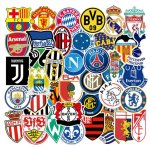Football (or soccer) is the most popular sport in the world. In Europe, it’s not just a game—it’s a massive culture involving clubs, leagues, players, and fans.
What is Club Football?
Every country in Europe has a football league system. Clubs (teams) from cities or regions compete in these leagues. The top five European football leagues—known as the “Big Five”—are:
1. Premier League – England
2. La Liga – Spain
3. Serie A – Italy
4. Bundesliga – Germany
5. Ligue 1 – France
Each league usually has 18–20 clubs, and each team plays every other team twice (home and away) in a season. Points are awarded: 3 for a win, 1 for a draw, 0 for a loss. The team with the most points at the end wins the league.
Smaller Yet Famous Leagues:
Below the Big Five are strong leagues like:
Portuguese Primeira Liga (clubs like FC Porto, Benfica)
Dutch Eredivisie (Ajax, PSV)
Belgian Pro League (Club Brugge)
Turkish Süper Lig (Galatasaray, Fenerbahçe)
These leagues are slightly less competitive but still produce great talent and have huge fanbases.
Promotion and Relegation:
European leagues have a “promotion and relegation” system. If a team finishes at the bottom of the league, it gets relegated (moved down) to a lower division. The best teams from the lower division move up. This keeps competition intense and fair.
European Competitions:
Top teams from each domestic league qualify to play in European tournaments:
1. UEFA Champions League (UCL):
The most prestigious. The best teams from each country compete. Think of it as a “super league” for Europe. Winning the UCL is the highest honour in club football.
2. UEFA Europa League (UEL):
For teams that finish just below the top spots in their leagues.
3. UEFA Conference League (UECL):
The third-tier European competition for smaller clubs or those from weaker leagues.
Other Important Competitions:
Domestic Cups:
Each country has a cup competition (e.g., FA Cup in England, Copa del Rey in Spain). It’s a knockout format and often includes lower-division teams.
Super Cups:
A one-off match, usually between the league winner and the domestic cup winner.
Transfers and Players:
Players are bought and sold between clubs, mostly during two transfer windows—summer and winter. Richer clubs (like Real Madrid, Manchester City, PSG) can afford top players. Smaller clubs usually develop talent and sell them for profit.
Why It’s a Big Deal:
European football is emotional, strategic, and tied to local identity. Fans live for their club's wins and suffer in their losses. Matches are watched globally. Rivalries (like El Clásico: Real Madrid vs. Barcelona) are legendary.
In short, European football is a web of leagues, clubs, competitions, and passion. Every match, every point, and every transfer means something.
What is Club Football?
Every country in Europe has a football league system. Clubs (teams) from cities or regions compete in these leagues. The top five European football leagues—known as the “Big Five”—are:
1. Premier League – England
2. La Liga – Spain
3. Serie A – Italy
4. Bundesliga – Germany
5. Ligue 1 – France
Each league usually has 18–20 clubs, and each team plays every other team twice (home and away) in a season. Points are awarded: 3 for a win, 1 for a draw, 0 for a loss. The team with the most points at the end wins the league.
Smaller Yet Famous Leagues:
Below the Big Five are strong leagues like:
Portuguese Primeira Liga (clubs like FC Porto, Benfica)
Dutch Eredivisie (Ajax, PSV)
Belgian Pro League (Club Brugge)
Turkish Süper Lig (Galatasaray, Fenerbahçe)
These leagues are slightly less competitive but still produce great talent and have huge fanbases.
Promotion and Relegation:
European leagues have a “promotion and relegation” system. If a team finishes at the bottom of the league, it gets relegated (moved down) to a lower division. The best teams from the lower division move up. This keeps competition intense and fair.
European Competitions:
Top teams from each domestic league qualify to play in European tournaments:
1. UEFA Champions League (UCL):
The most prestigious. The best teams from each country compete. Think of it as a “super league” for Europe. Winning the UCL is the highest honour in club football.
2. UEFA Europa League (UEL):
For teams that finish just below the top spots in their leagues.
3. UEFA Conference League (UECL):
The third-tier European competition for smaller clubs or those from weaker leagues.
Other Important Competitions:
Domestic Cups:
Each country has a cup competition (e.g., FA Cup in England, Copa del Rey in Spain). It’s a knockout format and often includes lower-division teams.
Super Cups:
A one-off match, usually between the league winner and the domestic cup winner.
Transfers and Players:
Players are bought and sold between clubs, mostly during two transfer windows—summer and winter. Richer clubs (like Real Madrid, Manchester City, PSG) can afford top players. Smaller clubs usually develop talent and sell them for profit.
Why It’s a Big Deal:
European football is emotional, strategic, and tied to local identity. Fans live for their club's wins and suffer in their losses. Matches are watched globally. Rivalries (like El Clásico: Real Madrid vs. Barcelona) are legendary.
In short, European football is a web of leagues, clubs, competitions, and passion. Every match, every point, and every transfer means something.



